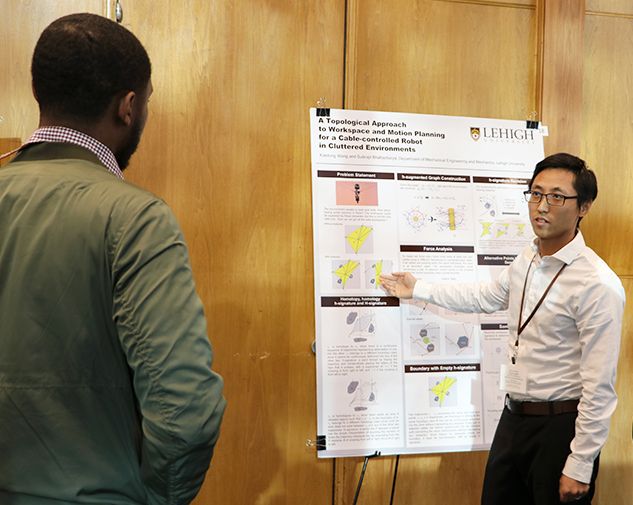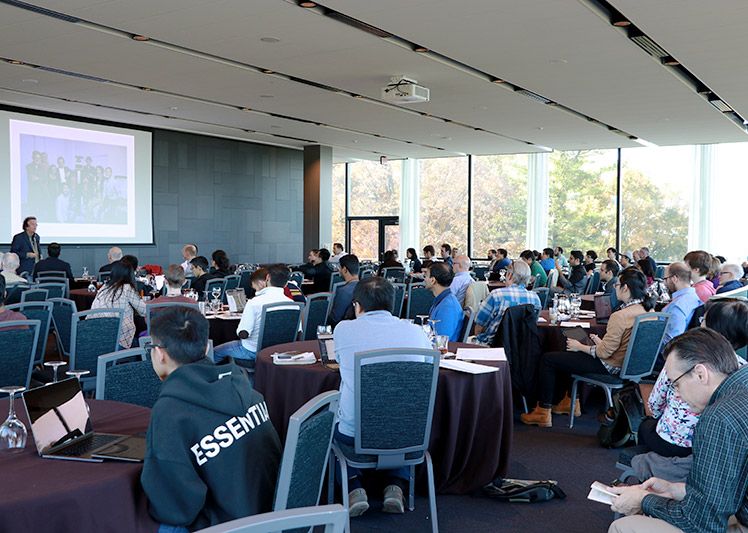Through the windows of the Wood Dining Room, the trees were in full tri-colored glory and a trio of hawks carved effortless turns on the wind currents. But no one was paying any attention. Instead, participants in the Robotics Learning Workshop sat in silence, fingers hovered over laptops, focused only on the speaker at the front of the room.
The two-day event started October 14 and was the second in a series of conferences and lectures funded by a National Science Foundation TRIPODS+X grant awarded to Lehigh’s Institute for Data, Intelligent Systems, and Computation (I-DISC). The series addresses topics including applications of machine learning and big-data science in chemical processes, autonomous robotics, supply chain optimization, and cognitive neuroscience.
Late in 2018, the NSF unveiled its support for I-DISC to organize these open workshops, part of a broader funding announcement around $8.5 million in grants for 19 collaborative projects involving 23 U.S. universities. Two of the grants were awarded to Lehigh.
“The workshop was a great success,” says I-DISC co-director Héctor Muñoz-Avila, a professor of computer science and engineering at the P.C. Rossin College of Engineering and Applied Science and one of the workshop organizers. “We had great topical diversity in the talks, ranging from philosophical questions about the nature of machine learning to frontier topics like coordinating teams of robots.”
The event featured 16 invited speakers, plus one Lehigh presenter, an interactive panel session, and a poster session highlighting the work of 26 graduate students from 11 universities. More than 170 people registered for the workshop, more than a third of whom came from outside the university.
Over two days, participants were exposed to cutting-edge research across a range of research areas, says Nader Motee, an associate professor of mechanical engineering and mechanics and lead organizer of the event. Those areas included feature extraction, deep and reinforcement learning, reasoning and logic, map reconstruction and localization, among many others.
“Robot learning is an intrinsically multidisciplinary subject, and we had representatives from almost all these areas,” says Motee. “So it was a great opportunity for students to interact with each other as well as our speakers.”
For those who weren’t able to attend, Motee says nearly all the presentations were recorded and posted on the workshop website.
“We want to make the discussions we had here a reference point for researchers around the world,” he says.
The next workshop in the series, planned for Spring 2020, will focus on cognitive neuroscience.
About I-DISC
The Institute for Data, Intelligent Systems, and Computation (I-DISC) at Lehigh is devoted to the study of problems that involve massive amounts of data and/or large-scale computations, and developing the science that enables the extraction of useful and actionable information across disciplines and research fields. The analysis of complex and massive datasets and the development of sophisticated computational models are essential to our understanding and prediction of complex phenomena and systems associated with personalized medicine, healthcare delivery, transportation systems, social networks, the human brain, global climate, and international economic development. I-DISC builds upon the foundation of Lehigh research expertise in areas such as machine learning, optimization, probabilistic modeling, data-driven decision making, high-performance and data-intensive computing, statistical signal and image processing, data representation and management, modeling and simulation, robotics and computer vision, business and management technology, and privacy and security. Teams of researchers combine fundamental data and computational approaches with those focused on critical applications, utilizing core high-performance computing and cyber–physical systems facilities, creating a fertile space for collaboration with industrial, academic, and governmental partners to attack some of the most pressing problems in technology and society.



